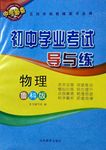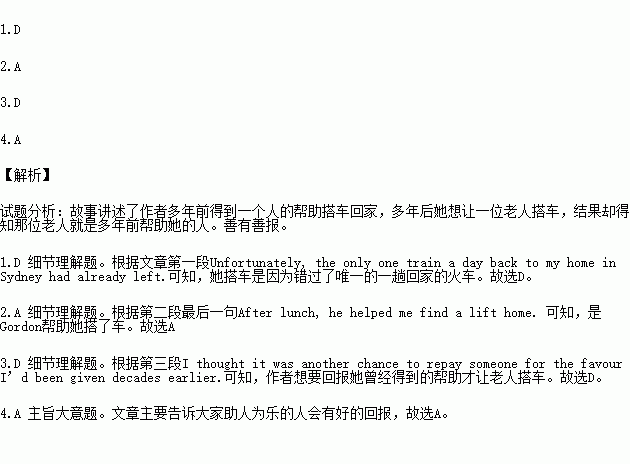题目内容
In 1978, I was 18 and was working as a nurse in a small town about 270 km away from Sydney, Australia. I was looking forward to having five days off from duty. Unfortunately, the only one train a day back to my home in Sydney had already left. So I thought I’d hitch a ride (搭便车).
I waited by the side of the highway for three hours but no one stopped for me. Finally, a man walked over and introduced himself as Gordon. He said that although he couldn’t give me a lift, I should come back to his house for lunch. He noticed me standing for hours in the November heat and thought I must be hungry. I was doubtful as a young girl but he assured (使…放心)me I was safe, and he also offered to help me find a lift home afterwards. When we arrived at his house, he made us sandwiches. After lunch, he helped me find a lift home.
Twenty-five years later, in 2003, while I was driving to a nearby town one day, I saw an elderly man standing in the glaring heat, trying to hitch a ride. I thought it was another chance to repay someone for the favour I’d been given decades earlier. I pulled over and picked him up. I made him comfortable on the back seat and offered him some water.
After a few moments of small talk, the man said to me, “You haven’t changed a bit, even your red hair is still the same.”
I couldn’t remember where I’d met him. He then told me he was the man who had given me lunch and helped me find a lift all those years ago. It was Gordon.
1.The author had to hitch a ride one day in 1978 because .
A. her work delayed her trip to Sydney
B. she was going home for her holidays
C. the town was far away from Sydney
D. she missed the only train back home
2.Which of the following did Gordon do according to Paragraph 2?
A. He helped the girl find a ride.
B. He gave the girl a ride back home.
C. He bought sandwiches for the girl.
D. He watched the girl for three hours.
3.The reason why the author offered a lift to the elderly man was that .
A. she realized he was Gordon
B. she had known him for decades
C. she was going to the nearby town
D. she wanted to repay the favour she once got
4.What does the author want to tell the readers through the story?
A. Giving sometimes produces nice results.
B. Those who give rides will be rapid.
C. Good manners bring about happiness.
D. People should offer free rides to others.
 初中学业考试导与练系列答案
初中学业考试导与练系列答案
